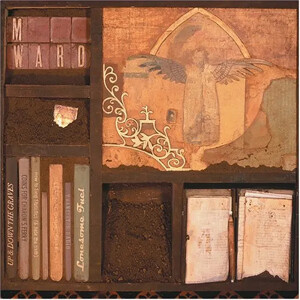 Ever since his first album Duets For Guitar, No. 2 was released by Howe Gelb’s Ow Om label around the turn of the century (where it remains one of the label’s best sellers), Matt Ward has produced albums with a coherent sound and vision. The sound is mostly acoustic, based on his highly accomplished, John Fahey-influenced guitar fingerpicking, paired with a voice like honey-coated sandpaper, and overlaid with a blurry patina of subtle electronic noises, washes, echoes and samples. The vision is slightly jaded romanticism that evokes shy misfits, wallflowers and shoegazers steeped in literature, poetry and classical music. M. Ward pays tribute to the mostly dead and gone world of independent radio stations on his fourth release Transistor Radio.
Ever since his first album Duets For Guitar, No. 2 was released by Howe Gelb’s Ow Om label around the turn of the century (where it remains one of the label’s best sellers), Matt Ward has produced albums with a coherent sound and vision. The sound is mostly acoustic, based on his highly accomplished, John Fahey-influenced guitar fingerpicking, paired with a voice like honey-coated sandpaper, and overlaid with a blurry patina of subtle electronic noises, washes, echoes and samples. The vision is slightly jaded romanticism that evokes shy misfits, wallflowers and shoegazers steeped in literature, poetry and classical music. M. Ward pays tribute to the mostly dead and gone world of independent radio stations on his fourth release Transistor Radio.
The album, which like old LPs is divided into two sides, with a total of 16 tracks, opens and closes with instrumental pieces. The former is a jaunty arrangement of Brian Wilson’s “You Still Believe in Me,” with Ward’s signature minor-key middle-eight; the latter is a bluesy arrangement for solo guitar of one of the more famous movements from J.S. Bach’s “Well-Tempered Clavier.”
In between are a host of lovely songs. Side A highlights include the show-tune cheesiness of “Sweethearts on Parade,” (Guy Lombardo) the bed-sitter’s lament of “Fuel for Fire,” the surf-style instrumental “Regeneration #1,” and the railroad-rhythm rocker of “Four Hours in Washington.” The side ends with the piano-driven punkish rocker “Big Boat,” reminiscent of a classic Elton John song if covered by the Minutemen, with thudding bass and booming kickdrum, a pounding boogie-piano rhythm, and harmony vocals by Vic Chesnutt and Jenny Lewis (of Rilo Kiley).
Ward has help from a host of quality guests, including some piano from Gelb, guitar and vocals from Jim James of My Morning Jacket, bass and recording by Nick Luca, and drumming from John Parish and fellow Portland, Oregon, residents Mike Coykendall (Old Joe Clarks) and Rachel Blumberg (Decemberists).
The second side opens with “Paul’s Song,” a lonely lament of the musician’s life on the road, with Paul Brainard’s steel guitar adding poignancy. Ward pays tribute to the late George Harrison on “Here Comes the Sun Again” (built around the same chord progressions as the original), brings back memories of radio soap operas with the trembling organ on “Deep Dark Well,” and remakes “I’ll Be Yr Bird” from his first album.
The stark instrumentation and rustic soundscapes complement Ward’s alternately wry, romantic and transcendent lyricism. He paints a perfect portrait of self-pitying loneliness in “Fuel for Fire” with verses like this one: “Got 45s to play at night/Got books to spend with every weekend/the story’s always the same/got lonesome fuel for fire.” Samples of Pablo Casals’ cello waft in the window on the breeze as the song fades out. In the warmly upbeat “Here Comes the Sun Again” we see all of nature welcoming the sunshine, except for the protagonist, who asks tongue in cheek for the sun, famously rare in Oregon, to “show some mercy today/blow a little breeze on my face.”
With Transistor Radio M. Ward continues an unbroken string of excellent albums, filled with original songs that reflect his idiosyncratic take on Americana, rock and the blues.
(Merge, 2005)
